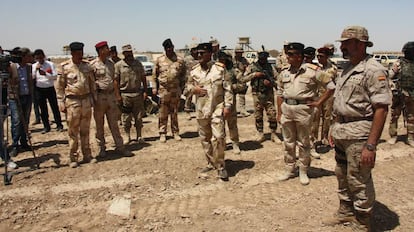Spain bolsters its commitment to Iraq after 18-month delay
Government set to increase presence to 400 personnel, as well as joining task force in Latvia
After an 18-month delay, Spain is to send a further 100 military personnel to Iraq, increasing its presence there to 400. It will also extend the presence of its Patriot anti-missile batteries in Turkey, and for the third year running, contribute four fighter jets to the NATO force monitoring the air space over the Baltic republics, along with a mechanized unit to Latvia, also under the command of NATO.

The measures, delayed by the 10-month political impasse following inconclusive elections in December 2015, were announced on Tuesday by Foreign Minister Alfonso Dastis at a NATO meeting of foreign ministers to bid farewell to US Secretary of State John Kerry.
Among the personnel being sent to Iraq will be 25 members of the Civil Guard, who have been specifically requested by the government in Baghdad to help train police officers to be sent to areas liberated from ISIS.
A total of 2,235 military personnel, including Civil Guard officers, are based abroad
The Spanish mission participating in the international coalition against ISIS has already trained some 6,000 Iraqi soldiers since the first forces arrived at Besmayah base, 40 kilometers south of Baghdad, in February 2015, according to the Spanish Defense Ministry.
Spain is part of a US-led global coalition in Iraq made up of 65 countries, with 21 involved in training members of the Iraqi Armed Forces.
Spanish troops in Iraq are mainly involved in training Iraqi troops in dealing with improvised explosive devices (IEDs).
A team of Spanish green berets has recently been stationed at a base near Mosul to train Iraqi commando units that have been actively involved in fighting to recapture territory held by ISIS.
Spanish troops have already trained some 6,000 Iraqi soldiers
Spain has agreed to keep Spanish Patriot missile batteries at the Incirlik for another six months to protect Turkey from potential threats from neighboring Syria.
Despite the purge of thousands of members of the Turkish military in the wake of the failed coup this summer, among them many who were due to contribute to NATO units, the United States and its allies have not criticized President Recep Tayyip Erdogan, who is seen as a key ally against Russia, Syria and Iran.
Spain is to join the Canadian-led 1,000-strong NATO battalion posted to Latvia in the wake of Russia’s annexation of Crimea in the spring of 2014.
The country will continue its presence over Baltic airspace to protect against Russian incursions as part of a mission based in Amari, in Estonia. Some 100 Spanish military personnel have been there since 2015.
Before the end of the year the Cabinet is expected to approve the continuation of all Spain’s overseas military missions. A total of 2,235 personnel from the army, navy and air force, along with the Civil Guard, are based abroad. In Lebanon, they are part of an international team monitoring a ceasefire between Israel and Hezbollah. The country also takes part in the EU’s Operation Atalanta mission to reduce piracy in the Indian Ocean, as well as patrolling the central Mediterranean as part of efforts to combat people trafficking from Libya, and in Mali, where soldiers help train the army to defeat Jihadists operating in the Sahel.
English version by Nick Lyne.
Tu suscripción se está usando en otro dispositivo
¿Quieres añadir otro usuario a tu suscripción?
Si continúas leyendo en este dispositivo, no se podrá leer en el otro.
FlechaTu suscripción se está usando en otro dispositivo y solo puedes acceder a EL PAÍS desde un dispositivo a la vez.
Si quieres compartir tu cuenta, cambia tu suscripción a la modalidad Premium, así podrás añadir otro usuario. Cada uno accederá con su propia cuenta de email, lo que os permitirá personalizar vuestra experiencia en EL PAÍS.
¿Tienes una suscripción de empresa? Accede aquí para contratar más cuentas.
En el caso de no saber quién está usando tu cuenta, te recomendamos cambiar tu contraseña aquí.
Si decides continuar compartiendo tu cuenta, este mensaje se mostrará en tu dispositivo y en el de la otra persona que está usando tu cuenta de forma indefinida, afectando a tu experiencia de lectura. Puedes consultar aquí los términos y condiciones de la suscripción digital.









































